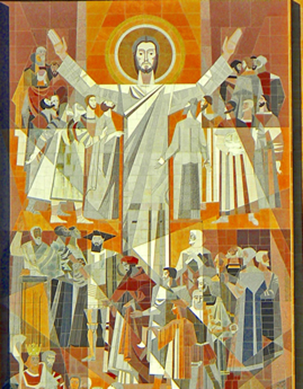Memorial Liturgy: James Martin (2023)
Scripture Readings

There are actually two Christianities: an ethical Christianity and a mystical Christianity. Ethical Christianity is concerned with right living; mystical Christianity is concerned with eternal life. The Jesus of ethical Christianity is a teacher and moral guide. The Jesus of mystical Christianity is our pioneer, leading us forward into a new and alien land.
When I first learned to fly a plane, we used radio signals for navigation. To get from point A to point Z, we flew to radio tower B, then tower C, and D, and so on, until we reached our destination. Each tower had its own set of specifications. That’s how ethical Christianity works, taking people from one decision point to the next.
Then came GPS, and we were no longer tied to guideposts. We could set our course, and the GPS signal would take us to our destination. We didn’t have to worry about all the specifics along the way. Likewise, in mystical Christianity, Jesus is no longer seen as just another moral teacher. He himself is the Way, the Truth, and the Life.
As followers of Christ, we’re much more than students of a set of ethical principles. We’ve been united with Christ. We live in Christ and Christ lives in us. As Saint Paul told us, “We were indeed buried with him through baptism into death, so that, just as Christ was raised from the dead by the glory of the Father, we too might live in newness of life.” He tells us that our union with the death and resurrection of Christ has freed us from sin. What does that mean? It means we are set free from the fear of transgressing the law. We’ve been freed from having to worry about the consequences of missing a guidepost and possibly losing our way.
That’s what we’ve been freed from—what are we freed for? We’re free to live and to love…forever. Jesus says, “For this is the will of my Father, that everyone who sees the Son and believes in him may have eternal life, and I shall raise him on the last day.” When is the last day? It is today. That’s the only day we have, and the only day we’ll ever have.
And so, today, on this anniversary of James’s death, we take time to remember and reconnect. James’s life has reached its fulfillment—the fulfillment of the promise of eternal life given him at his baptism. Our pilgrimage continues, but it is the same pilgrimage. Our celebration of the eucharist this morning connects us to the risen Jesus, to James, to one another, and to all who share in the newness of life. In that life, we are forever one. As Saint Paul writes, “[There is] one body and one Spirit, as you were also called to the one hope of your call; one Lord, one faith, one baptism; one God and Father of all, who is over all and through all and in all.”